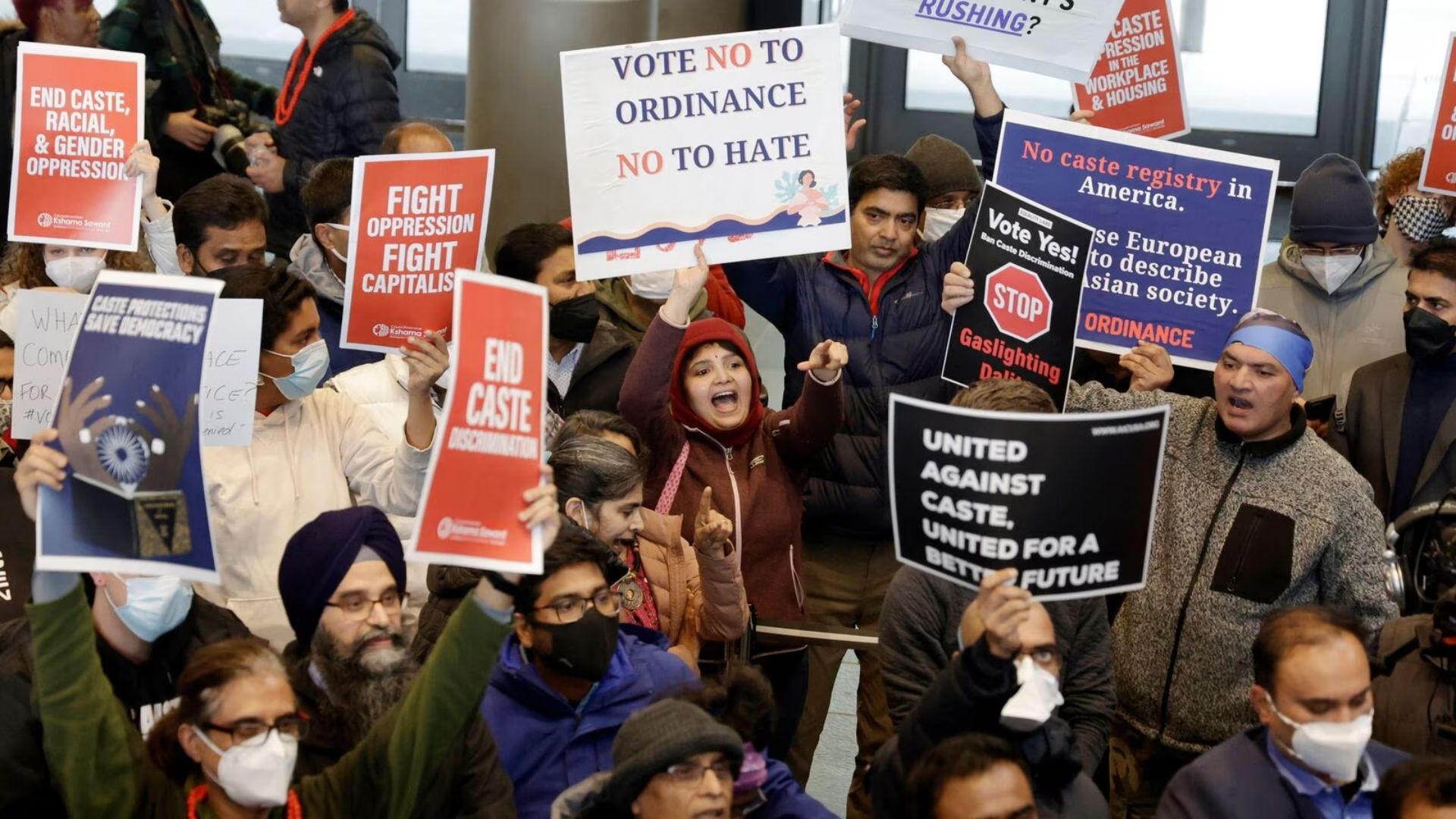Almost daily, I read an article about my Hindu American community that shocks me. These stories, increasingly alleging caste discrimination, often assume an angle that is discordant with our reality and ignorant of our history. My micro-minority religious community—we are 1% of the US population—is fighting for the right to define our own religious beliefs while protecting our brothers and sisters around the world, persecuted by the same forces targeting us.
The American Anti-Caste Movement
The groups pressuring universities and lawmakers to pass bills like California’s SB403 “banning” caste discrimination are capitalizing off of a caste narrative that is being increasingly racialized. It is uniquely American to view conflict through a reductive racial lens. In this case, Hindu Americans are labeled the “white supremacists” of the Asian diaspora while their alleged victims, the “caste oppressed”, are likened to Black Americans. This elicits a powerful, but misplaced, emotion in many well-meaning Americans and is fomented by influential personalities in universities like Harvard and Rutgers.
The forces pushing these angles depend on the deeply ingrained association between Hinduism and caste built into the American consciousness. In fact, anti-Hindu prejudices are often subconscious and have been reinforced through high school textbooks and missionary literature. Just Google the word “caste” and the link to Hinduism is ubiquitous. With these foundational biases in place, private groups like Equality Labs claim that these bills don’t target the Hindu community specifically, but rather, South Asians at large.
At the heart of the push for “caste equity” is the posturing that Dalits, formerly referred to as “untouchables,” are inherently oppressed by virtue of their birth, no matter where they are located or how wealthy they may be. There are ample testaments from American Hindus, including Dalits, that systemic discrimination simply isn’t present in the diaspora. The 2021 Carnegie Endowment’s study on Indian Americans clearly chronicles this. American Dalits like Sudha Jaganathan and Aldrin Deepak, senior leaders in the Coalition of Hindus of North America, have regularly challenged the claim that Equality Labs speaks for their communities. Their stories rarely get coverage.
The flaw in these caste bills is fundamental: they fail to delineate how to identify someone’s caste. Such lack of clarity in legislation can be tremendously damaging. These bills assign American understandings of “privilege” and “oppression” onto poorly understood religious and ethnic communities, making Hindu Americans victims of another wave of colonization.
Silence on the Fate of Pakistan’s Hindu Dalits
Rather than focusing on the betterment of the truly oppressed, the American anti-caste movement targets Hinduism and Hindu organizations. This is evident in the coalition’s indifference to Dalit persecution in Pakistan and Bangladesh. Inconveniently, these Dalits are overwhelmingly Hindu.
My first exposure to advocacy for Bangladeshi and Pakistani Hindu Dalits was in 2011 when I participated in the Hindu American Foundation’s annual DC Advocacy Day. We visited with several congressmen to discuss the forced conversion of minor Hindu girls to Islam. Our “ask” was that the US place human rights contingencies on its seemingly endless cash flow to Islamabad.
Pakistan, an Islamic republic, has the strictest blasphemy and apostasy laws in the world. Like other minorities, Dalit Hindus are actively persecuted by the state. Rape is often used to pressure kidnapped minority women and boys to convert. Even as their families fight to retain custody of their children, the act of conversion is immutable, prohibiting the children from returning to their birth religion.
The cases of Rinkle Kumari and Kareena Kumari (no relation) have made international headlines, even though both women were denied justice and are living with their abductor husbands. In 2022, 15-year-old Pooja Kumari was murdered by an older man; she rejected his advances to convert her to Islam so he could marry her, resulting in her execution on the front step of her home. This phenomenon continues today. In March 2023, 13-year-old Krishna Bheel was abducted while returning home from school and remains missing.
Most of these girls happen to share a surname, Kumari, because they are Dalits from the Pakistani province of Sindh. Other common surnames for the missing Hindu children are “Kholi” and “Bheel,” belonging to other Dalit communities.
Over 90% of Pakistani Hindus live in Sindh. In the 1931 British India census, Sindh’s Hindu population stood at 26%. Partition in 1947 saw an exodus of Hindus to India. Today, Hindus live in rural areas and are overwhelmingly Dalit. The government forces Hindus to choose between classification as “Hindu” or “scheduled caste” (Dalit). The 2017 census puts the number of Hindus at 6.9% and Dalits at 1.74%. Experts believe the number of Dalits to be much higher, as they consider those that opted for the label “Hindu” as opposed to “Dalit” on the census.
Many far-left groups clamoring for caste laws in the US cite violence against Dalits in India, particularly sexual violence, to allege that anti-Dalit discrimination is baked into the fiber of Hindu society. Their indifference to state-sponsored violence against Dalit Hindu children in Pakistan however lends itself to my concern as a Hindu American: their activism is rooted in Hinduphobia rather than justice for Dalit lives.
The Ignored and Persecuted Hindus of Bangladesh
This intentional indifference became even clearer last year when House Resolution 1430, recognizing the special targeting of Bangladeshi Hindus in 1971, failed to make it to vote in the US Congress. In 1971, Bangladesh was still East Pakistan and faced a terrible military backlash against calls for independence from Islamabad. While simultaneously targeting Bengali intellectuals and political leaders, the Pakistani army unleashed a wave of brutality against the sizable Hindu minority. This disproportionate violence can be understood against the backdrop of the Pakistani national identity being a rejection of “Indianness” and “Hinduness.”
Hindus accounted for nearly 80% of those killed in the 1971 genocide.
House Resolution 1430 faced strong opposition from the same groups pushing today’s anti-caste measures, like the misleadingly named Hindus for Human Rights (HfHR). While denying official recognition for the genocide of Bangladeshi Hindus in 1971, the focus of HfHR’s international campaign is to draw attention to an impending “genocide” against Muslims in India, whose population has steadily risen since 1947. Between 1951 and 2011, this percentage has gone up from 9.8% to 14.4%, and Indian Muslims currently number at around 180 million.
HfHR acknowledged the Pakistani army’s anti-Hindu atrocities. However, it claims that these atrocities occurred because of anti-Bengali sentiments. This narrative denies facts well recorded by many sources, including the US State Department. The Blood Telegram by Princeton professor Gary J. Bass has chronicled “the hardhearted policy and outright bigotry” of even the American decision to support Pakistan during that campaign.
Without an accurate historical record, the Hindu diaspora is handicapped from demonstrating the extent of systemic anti-Hindu bigotry. HfHR also vocally opposed an Indian law that would give minority refugees fleeing religious persecution in Pakistan and Bangladesh a path to Indian citizenship, forcing them to remain stateless.
Like Pakistan, a significant number of Hindus remaining in Bangladesh after the 1947 partition are Dalits. The Bangladeshi government does not conduct a caste census and many Hindus resist identifying with a caste for the same reasons as Pakistani Hindus: they do not seek to make themselves more vulnerable in a majority Muslim country with increasingly intolerant tendencies. This is incidentally the same source of unease many American Hindu Dalits express with the push to unmask and identify South Asian Americans by their castes today.
After the dust of partition settled, the first Pakistani national census in 1951 placed the Hindu population at 22% of East Pakistan. Per the 2011 Bangladesh census there were 12 million Hindus in the country, 8.9% of the population. This dramatic fall in the Hindu population over 60 years reflects the genocide and ensuing exodus to India. The group Nagorik Udyog, a Dalit advocacy group in Dhaka, placed the 2011 Dalit population at around 5.5 million. This population is overwhelmingly Hindu. I spoke to human rights advocates in Dhaka for this piece and they ballpark the Dalit composition of the Bangladeshi Hindu population at approximately 44%.
Crimes against Bangladeshi Hindus get far less coverage than the scant attention Pakistani Hindus receive. Well-organized attacks by Islamists during the fall Hindu celebration of Navaratri over the last two years have cloaked the vulnerable community in fear. The 2021 organized violence was particularly jarring, with around 100 Hindu temples vandalized and up to 10 Hindus killed over the ten-day holiday.
By calling themselves activists fighting global Islamophobia (as HfHR and Equality Labs do), American anti-caste groups harness their media access and wealth to undermine minority Hindu suffering. In doing so, they create a climate in which calling out Islamist bigotry is viewed as Islamophobia. Thus, they simultaneously shield dangerous religious ideologies from criticism while making it socially acceptable to deny Hindu persecution. So much for Dalit upliftment.
The push to legally recognize caste in the United States is steeped in Hinduphobia. When the California city of Fremont passed a symbolic anti-Hinduphobia bill in April, the executive director of Equality Labs broadcasted an angry tirade, putting her prejudice on full display. But like influential members of the South Asia Scholar Activist Collective, she refuses to use her privilege to protect the most vulnerable Dalits in the world.
American anti-caste legislation was never about protecting Dalits. It was always about persecuting Hindus.
[Fair Observer updated this article at 16.40 Eastern Time on Monday, 15 May.]
The views expressed in this article are the author’s own and do not necessarily reflect Fair Observer’s editorial policy.
Support Fair Observer
We rely on your support for our independence, diversity and quality.
For more than 10 years, Fair Observer has been free, fair and independent. No billionaire owns us, no advertisers control us. We are a reader-supported nonprofit. Unlike many other publications, we keep our content free for readers regardless of where they live or whether they can afford to pay. We have no paywalls and no ads.
In the post-truth era of fake news, echo chambers and filter bubbles, we publish a plurality of perspectives from around the world. Anyone can publish with us, but everyone goes through a rigorous editorial process. So, you get fact-checked, well-reasoned content instead of noise.
We publish 2,500+ voices from 90+ countries. We also conduct education and training programs
on subjects ranging from digital media and journalism to writing and critical thinking. This
doesn’t come cheap. Servers, editors, trainers and web developers cost
money.
Please consider supporting us on a regular basis as a recurring donor or a
sustaining member.
Will you support FO’s journalism?
We rely on your support for our independence, diversity and quality.







Comment